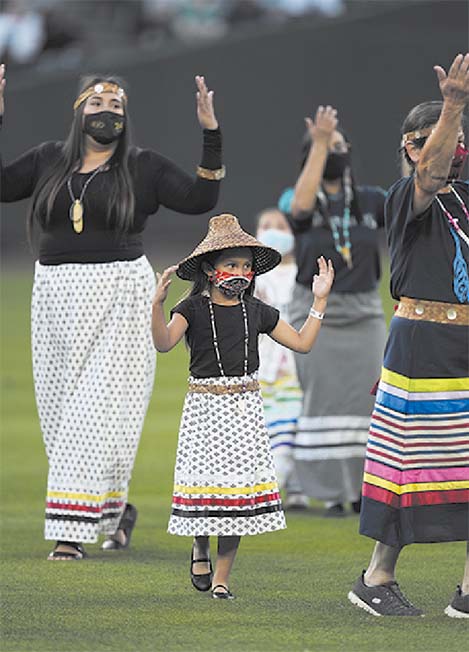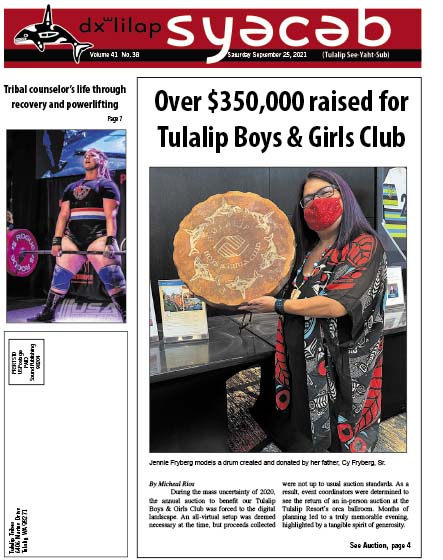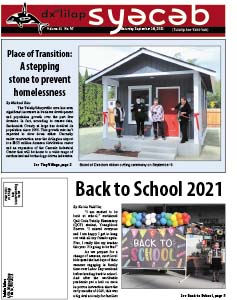
Category: Tulalip News
Potential life-saving treatment for COVID-positives available at Tulalip Health Clinic
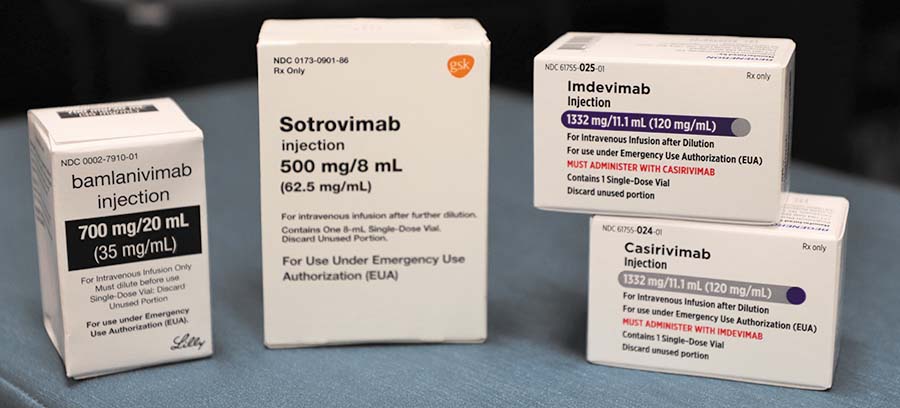
By Micheal Rios, Tulalip News
As COVID deaths continue to spike in Washington State — the 7-day average for deaths has reached its highest sustained peak all pandemic — newly developed treatments for the disease are beginning to receive global attention. Monoclonal antibody therapies are among the most effective. In this treatment, COVID-positive patients are infused with high concentrations of antibodies specifically designed to fight SARS-CoV-2, the virus that causes COVID.
On the Tulalip Reservation, a recent explosion of positive test results has corresponded with the return of in-person schooling and a number of large gatherings (birthday parties, funerals and community activities) Probable positives reached the triple digits in mid-September and yet another elder was a suspected pandemic casualty, bringing the total to 9 elders lost according to Emergency Management.
With the pandemic clearly not ending any time soon and many more COVID-positives a forgone conclusion at this point, the new interim Medical Director of Tulalip’s Health Clinic, Dr. Elizabeth TopSky (Chippewa Cree) has brought monoclonal antibodies to the reservation. She wants all eligible patients of the Health Clinic to know about this potentially life-saving treatment.
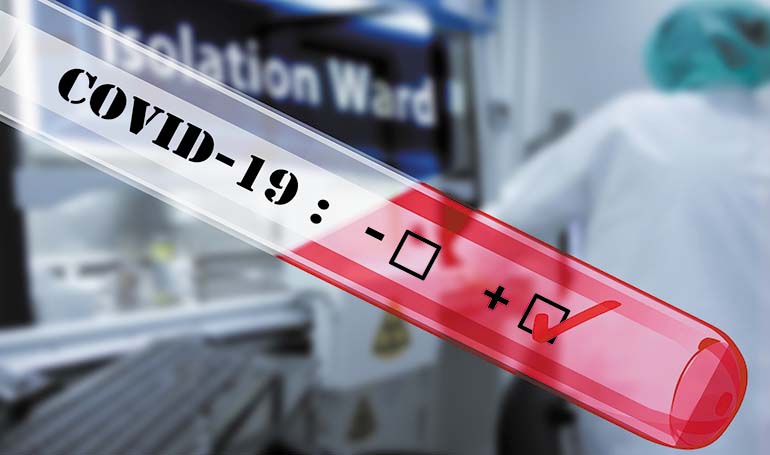
It is important to note this therapy is only available to those who have recently tested positive, and it can be administered to individuals as young as 12-years-old. Since mid-September the antibody treatment has been administered to multiple Tulalip elders and high-risk teenagers alike. The results have been overwhelmingly favorable.
One such elder, 81-year-old Keeta Sheldon, shared her experience with the antibody therapy. “Well, I was vaccinated so when I tested positive that was a bit of a surprise. My family reached out to local medical centers inquiring about this new antibody infusion and when they found out it was offered at our Health Clinic, they made the necessary arrangements,” she said. “The treatment only took 20 minutes and I felt pretty good right away.”
When asked if she’d recommend the monoclonal antibody treatment to her fellow tribal members, Keeta responded emphatically, “Yes. For those who catch COVID it’ll make them feel a whole lot better.”
Tulalip Health Clinic director Dr. TopSky was gracious enough to answer a few prevailing questions our readers may find insightful in regards to this breakthrough medicine intended to prevent severe symptoms and possible death from developing among our community’s most vulnerable.
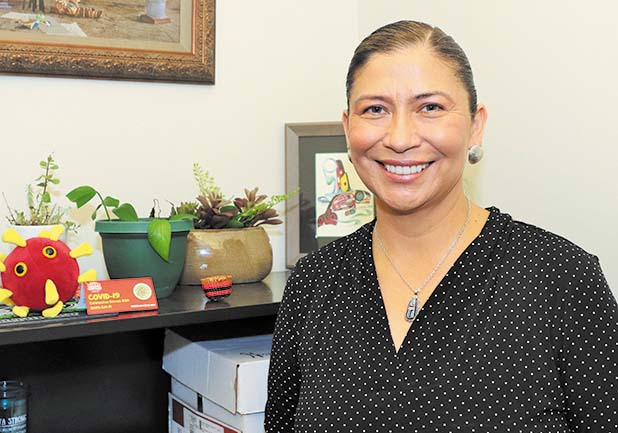
What is monoclonal antibody therapy?
Dr. TopSky: Monoclonal antibodies are laboratory-made proteins that bind to the spike protein of SARS-CoV-2 and block the virus’ attachment and entry into human cells. The product is available for the treatment of mild to moderate COVID-19 in adult and pediatric patients (over 12-years-old and weighing over 40 kg) who are at high risk for progressing to severe COVID-19 and/or hospitalization.
How is this therapy relevant in today’s current climate with the Delta variant running rampant in our community?
Dr. TopSky: Unfortunately, we have a fairly large population that is unvaccinated and we are dealing with the largest ever number of positive patients during this Delta surge. The vaccine is the first line in healthcare worker’s fight against negative outcomes from this infection. This therapy is a second option for our eligible patients to prevent hospitalizations and other complications. As a healthcare clinic, we are also able to help the local hospitals and ERs in this surge by providing this treatment to our eligible patients.
Who is eligible to receive this therapy at our Health Clinic?
Dr. TopSky: We are presently offering this therapy to eligible patients of our clinic when we are first aware they have tested positive. This is a collaboration from our medical staff and the Community Health Nurses. They have the information on community members who test positive outside of our clinic and forward to us. We review the list of positive patients to determine if they meet the criteria for the antibody infusion. We reach out to these patients at risk with a phone call.
If they voice interest, we then schedule an appointment for the infusion. Ideally, the infusion occurs as early as possible in the infection and needs to be completed in the first ten days of symptoms. The clinical worsening happens around 14 days and it can be difficult to predict who will worsen at that time. That’s why the guidelines are in place for who is eligible to receive the infusion.
To date, how many patients have received the antibody therapy at the Health Clinic?
Dr. TopSky: As of today, we have provided twelve treatments to our clinic patients, some of whom are not Tulalip tribal members. We will continue to monitor our positive patients and reach out to them by phone. We would definitely encourage any of our patients who test positive to reach out to us if they want to know if they meet the criteria.
We continue to improve our processes and we might not always be aware of a patient’s recent diagnosis. Howard Johnson, PharmD has been our primary contact for scheduling and providing this service. It does take 2-3 hours to complete and can be tiring sometimes for the patient when they are already not feeling well.
Any other pertinent information you’d like to share?
Dr. TopSky: Our medical providers and nursing staff, like all other healthcare providers in the country, are significantly overwhelmed with the present Delta surge. I would like to recognize them for their service to our patient population. They are exposed daily to this deadly virus and their dedication and service should not go unrecognized.
Also, we encourage everyone to get vaccinated when able as this is the first step in getting this pandemic under control. We are all in this together and getting vaccinated protects our families and community.
For more information about monoclonal antibody therapy and patient eligibility, please contact Tulalip’s clinical pharmacist Dr. Howard Johnson. He can be reached at (360) 716-5699
A tribal counselor’s life through recovery and powerlifting
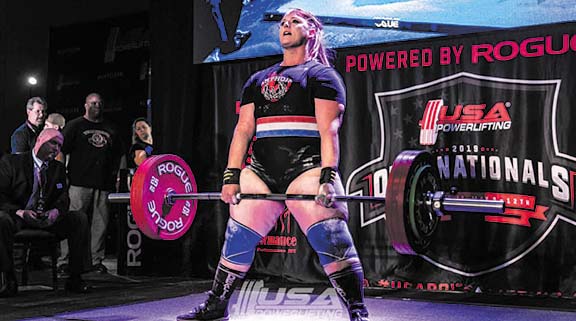
By Shaelyn Hood; photos courtesy of Andrea Page
Andrea Page is a recovering addict, counselor, powerlifter, student, and mother. 21 years ago, had you asked her if she could imagine herself today, she’d say, “No way”. At a time when she was struggling with her addiction and facing her biggest fear of the possibility of losing her children, Page made a choice and said, “It’s time for me to step up and do what I need to do, to try to be there for my kids”.
While living in Seattle, she sought out treatment and began her recovery journey. It was only then, through hard work and a strong support system, that she was able to turn her life around. She connected with many people who were on the same path of recovery who helped her begin a new and healthier future.
In 2010, Page made the decision to become a substance use disorder counselor. She felt that having been through the recovery process herself, that it could better help others, “It allows people to have that connection with somebody that understands, but also, I appreciate the community, being able to see how much support people can get from this community and how much change people can bring to the community in a good way”.
Eventually she took her skillset and started working for Tulalip Tribes in Family Services.
In 2011, shortly after starting her new career path, her friends who are also in recovery, introduced her to powerlifting. This new chapter in her life opened many new opportunities. She gave a lot of credit in her recovery to her support system, saying, “The thing that has helped me in my journey and recovery is not only having people that are also in recovery around me and doing things that are productive, but also my power lifting. I think a lot of that plays into my recovery too”.
Page is a part of the USA Powerlifting League that is widely known for their drug-free competitions. The USAPL promotes a clean, anti-drug, powerlifting environment, and requires drug testing before every competition. Page never imagined herself power lifting, and for a long time in her life had a hard time committing to outside activities. Power lifting gave her an outlet in her recovery and a way to show her strength in a way that’s more than just physical.
“I feel like I’ve been empowered by going to competitions. This is the one thing that has kept me focused, and driven, and it’s exciting to me”, she said.
Page also discussed how being a part of a team has given her more of a community and kept her motivated because she now had people that she needed to help and support. It has given her a sense of obligation to always show up.
Since her powerlifting journey started, she has won major titles such as, Master World Champion, 4x National Champion, she won the Best Female Master Lifter Award at Nationals in 2019, and the Washington State Athlete of the Year in 2018. Her Best Lifts include a 565lb squat, 325lb bench press, and 457lb dead lift. Her friends and family have become her biggest cheerleaders, by coming to her practices, competitions, and making jokes calling her “Squatzilla”. She’s also had opportunities to travel to Sweden, South Africa, and all over the US.
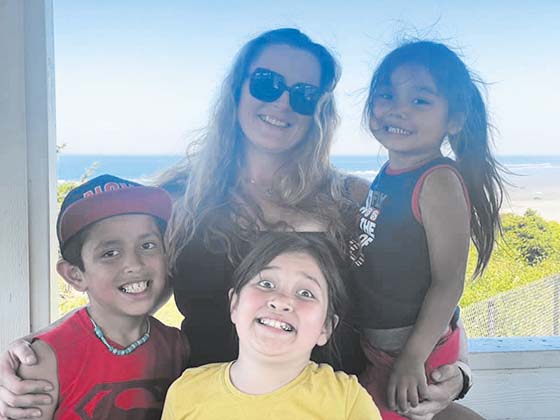
Through powerlifting and her new position in Family Services, she could see first-hand the need for assisting tribal children in finding new homes and potential adoption opportunities. At first, she thought about just doing respite care, and she would help take in children for a weekend here or there. But with more time, her love continued to grow for them. Soon after, the kids she had taken in were up for guardianship. She spoke with her family, and her new family unfolded. Page now has guardianship over three tribal children and feels so blessed to be a part of their lives.
One message that Page made very clear is that even though it might seem like she has achieved a lot, she’s just living her life, and she couldn’t have done it on her own.
“It was a lot of hard work, a lot of bumps in the road, which a lot of people in recovery experience,” said Page. “I can sit here and say I’ve accomplished this, this, and this, but if I didn’t have my support system around me, and the people who checked in on me, I wouldn’t have been able to do it”.
She also recommends to any tribal members that might be facing addiction, “just keep trying and find that support that’s going to help you achieve whatever it is you’re wanting to do. And no matter what, just keep pursuing your goals. Don’t give up. Even when things seem like they’re not working for you, or it just seems impossible, you have to put one foot in front of the other and keep trying, and always reach for those goals because eventually things will get better.”
She suggests that the first steps are to call family services and get in for an assessment. And for any members that have family struggling with addiction, “Be there for them. Don’t enable, just support them and get them help”.
If you, or someone you know is struggling with addiction, please contact Tulalip Tribes Behavioral Health at 360-716-4400.
September 25, 2021 syəcəb
Healing from within: Local Group aims to bring Recovery Café to Tulalip-Marysville area
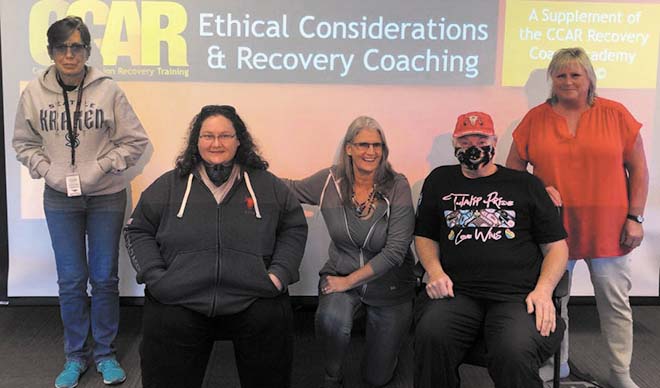
Gambling Program and taught by Whaakadup and Lisa Monger.
By Kalvin Valdillez, Tulalip News
Back in 2020, just weeks before the worldwide COVID-19 outbreak, the Tulalip Problem Gambling Program held a four-day training, over the course of two weekends, designed to build a network of support for local individuals on the road to recovery. Approximately twenty people attended the training and became certified recovery coaches, learning skills to help empower and encourage those battling addiction to stay the course, especially during difficult times when they are on the verge of a relapse.
“A recovery coach is someone in-between a sponsor and a counselor,” explained Problem Gambling Counselor, Robin Johnson. “They’re not there to tell them what to do. They are not doing the twelve steps with them, that’s not what they’re there for. They’re there to help, depending on their individual needs, finding out what those needs are, and meeting them there.”
She continued, “This is not the first recovery coach training that we’ve had, but it was by far the most successful. We’ve had better response and incorporated not only addiction, or chemical addiction, but also gambling addictions. Our philosophy is that we help the community heal from within, and the more people that we can teach to be recovery coaches, and have them in the community and available to others, that is just going to snowball. That was our hope and that is actually what seems to be happening at the moment.”
Through the recovery coach training, the Problem Gambling program planted a seed that is coming to fruition today. Six of those recovery coaches stayed in contact throughout the pandemic’s stay-at-home mandates, meeting virtually to discuss how they can spread the word and let those in recovery know they are available as a source of support, brainstorming ideas on how they can better serve their community. Ultimately, the group decided they needed a physical space where recovering addicts can go in times of distress and when in need of support, and with that came the idea of opening up a local Recovery Café.
The original Recovery Café was established in 2004 right here in the Pacific Northwest, in the Belltown neighborhood before migrating to South Lake Union in 2010. Since then, the Recovery Café has assisted not only those wanting to lead a clean and sober lifestyle, but also the homeless population in Seattle as well.
The café offers a positive environment where people can enjoy coffee and healthy meals while interacting with others in a number of activities including open mic nights and birthday celebrations. Café goers can take part in peer-to-peer groups such as recovery circles and they also have access to computers, WIFI and a plethora of resources. The Recovery Café model has been such a success that over 20 non-profit organizations have opened cafés of their own in cities throughout the country. And recently, a second location was opened in Seattle’s SODO district.
Although there is an established Recovery Café in Everett, opening a location in the Tulalip-Marysville area will benefit a community that has been significantly impacted by the opioid crisis over the years. This establishment could not come at a better time either as early projections predict that overdose cases and excessive gambling cases have been on the rise since the first wave of the pandemic hit. Offering a space where people can go to simply be around others who strive for the same goal can help during the recovery journey.
Still in the early planning phase, led by those six individuals who attended the Problem Gambling’s recovery coach training in 2020, the group is working on establishing a board of directors, designing a logo, raising funds and most importantly finding a space to set up shop. Ideally, the group would like the café to be in an area that is convenient and accessible to both Tulalip and Marysville community members. If you happen to be reading this and the perfect location comes to mind, the group would love to hear from you.
The recovery coaches also enlisted a number of professionals to help navigate the process of opening up the café, including Tulalip Tribal Prosecutor Brian Kilgore, Tulalip Recovery Liaison Helen Gobin-Henson, Tulalip ODMAP Social Worker Jackson Nahpi, and Robin Johnson and Sarah Sense-Wilson of the Problem Gambling program. The Tulalip Foundation has also leant their expertise to the project, helping the Café become a non-profit organization and apply for and obtain grants.
“I’m really excited about this group of people,” said Brian. “I think that they’re going to go out into the community and they’re going to create a physical space where people can come in and get wraparound support and services. I think that the power of having a physical place, around which to build services, is going to be really transformative for all the work we’re doing. Government, non-government, volunteers, we’re all working the same problem, right? We’re trying to save lives, trying to get parents back to their kids and rebuild families and communities and stop people from dying, but we just haven’t had a physical place to do it.”
Once the group finds a space to operate, they believe everything should easily fall in place, and they are aiming to have the café up and running by the end of the year. In addition to finding a space for the Café, the recovery coaches will be doing community outreach over the next couple months. If you are interested in helping get this project started and helping people maintain a clean and healthy lifestyle, please contact the Problem Gambling program at (360) 716-4304 for more information.
Helen expressed, “This project is important because we have nowhere for our people who are sober and clean, or want to get sober and clean, to gather. And we have so many people who are homeless, who are hungry, and they could come to the café and enjoy a meal. I feel like when the people who are sober and clean get together as a group, they can connect with each other and say, ‘Are you going to an in-person meeting today? I’d like to go with you’, or ‘what Zoom meetings are you hitting?’ They can connect there at the café. This is so important to me, to help the people who are sober, and encourage the people who might be thinking about getting sober and clean, find a safe and supportive place to gather.”
Over $350,000 raised for Tulalip Boys & Girls Club
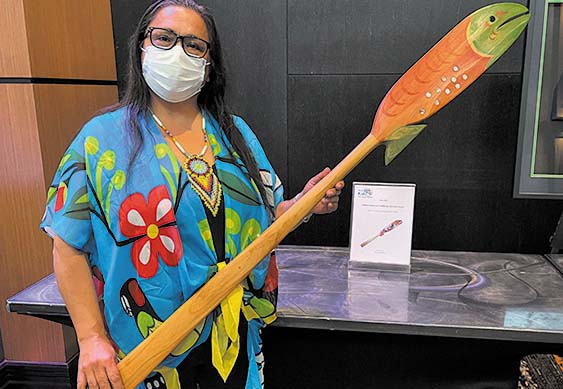
By Micheal Rios, Tulalip News
During the mass uncertainty of 2020, the annual auction to benefit our Tulalip Boys & Girls Club was forced to the digital landscape. An all-virtual setup was deemed necessary at the time, but proceeds collected were not up to usual auction standards. As a result, event coordinators were determined to see the return of an in-person auction at the Tulalip Resort’s orca ballroom. Months of planning led to a truly memorable evening, highlighted by a tangible spirit of generosity.
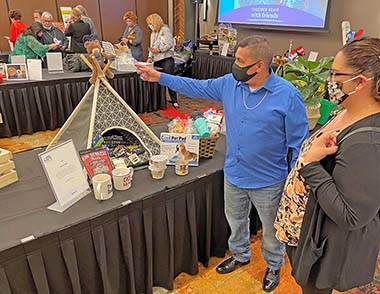
Dubbed ‘Together Again with Friends’, the 23rd annual Tulalip Boys & Girls Club auction occurred in elegant fashion with nearly 500 guests creating widespread enthusiasm while bidding on a number of one-of-a-kind items, tribal artwork, vacation packages, and sports memorabilia. The fundraising filled evening was all about giving donors and community partners an opportunity to take action for the benefit of local youth, while supporting the Tribe’s reservation based Boys and Girls Club.
“This evening’s auction was our largest fundraising event of the year. Your generous donations helped us achieve our goal to fund vital programs and services that improve the lives of youth in the Tulalip area,” stated Matt Monty, auction committee chairman. “[We’re] charged with deepening our impact on the young people we serve. These fundamental elements drive all of our efforts to have a lasting impact on youth.”
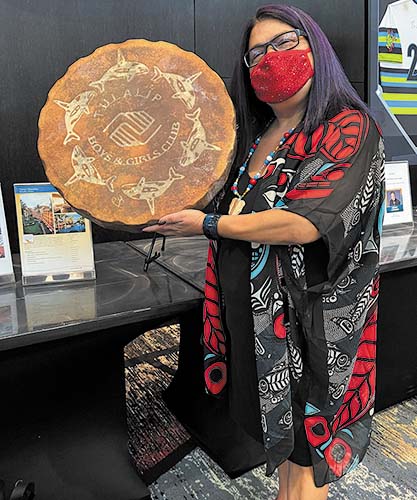
‘The Club’, as it’s affectionately been nicknamed by hundreds of regularly attending children, is a safe place where kids can just be kids. While there, children are routinely exposed to healthy food choices, create an abundance of happy memories, and make relationships that last a lifetime.
The Club is the first of its kind to be built on tribal land in Washington State. Established in 1995, 2021 marks twenty-six years of commitment to the community. Through before and after school programs, it aims to help young people improve their lives by building self-esteem, developing values, and teaching skills during critical periods of growth.
Serving as a model for those working to improve the lives of young people in the surrounding communities, the Club is the primary beneficiary of the annual fundraising auction. With each auction building off the success of previous years, the Club has not only been able to sustain services, but to complete much needed campus expansions that add additional learning and activity space.
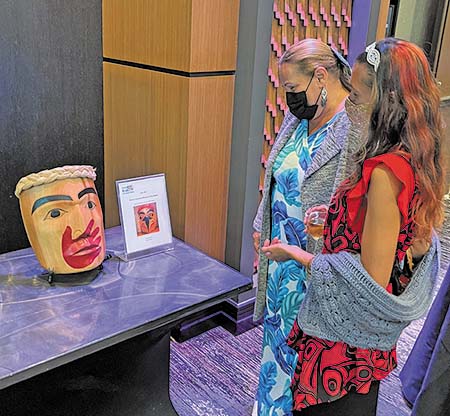
Funds raised from the annual actions are dedicated for capital improvement, not operating costs. Previous auction funds have paid for a state-of-the-art music studio, a multi-media room with twenty-plus computers, several transportation vehicles, roof repairs, upgraded kitchen equipment, and most recently a 4,000-square-footextension to better accommodate an ever-growing teenager membership. This teen center became invaluable during the past 18-months. In such a tumultuous time, local teenagers were able to depend on access to the tech-driven teen center to meet their social developing needs.
“It’s so funny looking back because I didn’t realize how much the Club meant to me as a kid, but really it was everything,” said Boys and Girls Club Director, Shawn Sanchey. The Tulalip tribal member has come full circle after he himself grew up a Club kid and now manages the same facility so many kids depend on every day. “It’s amazing being able to witness these kids learn and grow in the same way staff once did for me. Some of my earliest memories are of Grandma Diane offering guidance in her own special way. And two decades later, she’s still here and still knows the name of every kid who comes in routinely. It really is unique how dedicated people are to the youth in our community. It goes hand-in-hand with our mission to let our kids know we care about them and we care about their future.”
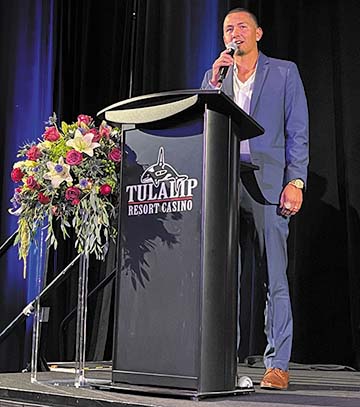
Of the 491 generous individuals who attended this year’s fundraising event, most have never been to Tulalip’s Boys & Girls Club, yet their passion for making a difference for our kids is heartfelt. The uplifting faces of Club kids ever-present on table centerpieces and projected onto screens bordering the ballroom, and those teenagers who volunteered to work the auction and help generate support by sharing their stories only aided in deepening the connection with auction attendees.
Shortly after the auction ended, event coordinators shared some delightful fundraising numbers. Exactly $51,500 was raised for Kids Kafé, which is an essential part of the Club’s services. Kids Kafé addresses the very basic fact that often the meals provided to club members are the most nutritious part of their daily diet. An impressive stat worth knowing is Kids Kafé served 6,400 meals per week and a whopping 230,400 meals over the past year.
In total, over $350,000 was raised between the silent and live auctions, including the enormous amount of support for Kids Kafé. There were so many generous contributors who played a critical role in making the 23rd annual auction possible.
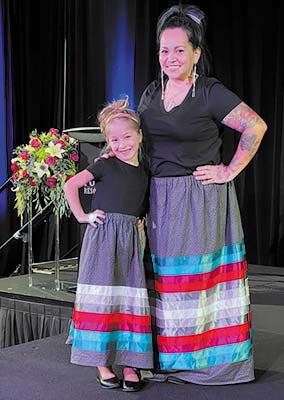
“The auction is really about building relationships with the community and continuing to build upon the strong foundation of support we have with the Tulalip Tribes, Snohomish County, and Tulalip Resort Casino,” explained Terry Freeman, assistant director of development for the Boys & Girls Clubs of Snohomish County. “For twenty plus years now, our goal has remained the same – to create more and more partnerships off the reservation to achieve our goals on reservation. Thanks to our collaborative leadership teams, we continue to meet and exceed this goal.”
Thanks in large part to everyone who contributed and gave generously, the 23rd annual action was a major success. The generosity and heartfelt support received each year from sponsors and volunteers is overwhelming. As in years past, the funds raised from the auction will ensure Tulalip’s Club continues to provide and improve upon quality programs in a fun, safe and positive environment for our kids.
September 18, 2021 syəcəb
Place of Transition: A stepping stone to prevent homelessness
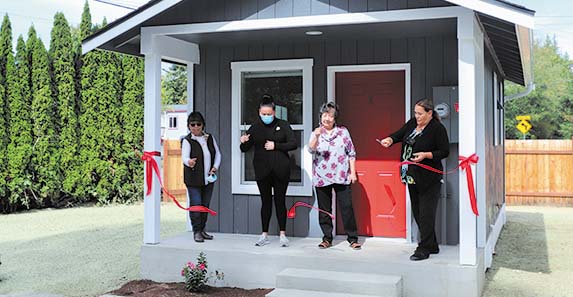
By Micheal Rios, Tulalip News
The Tulalip/Marysville area has seen significant increases in business development and population growth over the past few decades. In fact, according to census data, Snohomish County at large has doubled its population since 1990. This growth rate isn’t expected to slow down either. Currently under construction near the Arlington airport is a $355 million Amazon distribution center and an expansion of the Cascade Industrial Center that will be home to a wide range of mechanized and technology-driven industries.
What comes hand-in-hand with such growth booms is a dramatic rise in both the cost to own a home and the cost of rentals. A quick Google search of the local housing market and you may be shocked at the results. The average price tag to buy a house is nearly $500,000, while average rent for a three-bedroom apartment is north of $1,800 a month. These figures aren’t what a typical Tulalip head of household would call ‘affordable’.
Combine these costly housing figures with the super slim pickings of rentals and houses to buy on the Tulalip Reservation, and it means catastrophe for some. In this context, the catastrophe is homelessness. For a family with children, their worst nightmare. For an individual Tulalip citizen, a possible breaking point with no escape in sight.
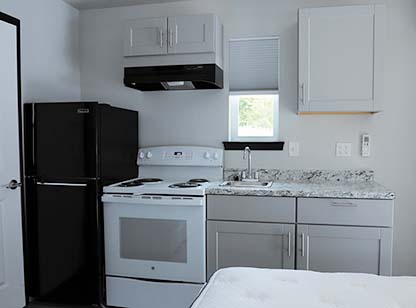
Tulalip Tribes leadership intends to offer a solution in the form of transitional units to its membership who are currently homeless or in imminent risk of becoming homeless.
“Transition units is an idea we had because we recognize a high level of homelessness that we are experiencing in Tulalip, and we wanted to make sure we had additional resources available,” explained Chief Operating Officer Wendy Fryberg. “We really want to focus on what ‘transition’ means for our members. We understand this comes at all levels of life experience, incomes, and ages. Having these transition units is a starting point for someone to have a place to wash their clothes, cook a meal, take a hot shower, and simply have a roof over their head.
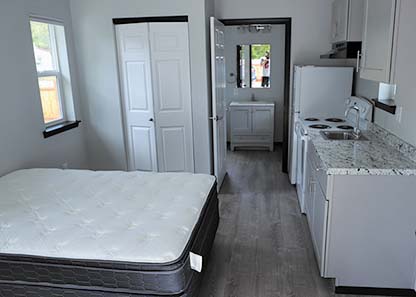
“Transition unit clients will be connected with a life coach who will assist in developing and working through a plan to achieve necessary goals for long-term, permanent housing,” she continued. “This site is a stepping stone for our membership designed to prevent homelessness. The name Place of Transition recognizes this setup as a temporary living arrangement with possible transition to the Tribe’s homeless shelter, future tiny homes coming next year, or the ultimate goal being transitioning to permanent housing.”
Back in early May, tribal council broke ground on the transitional living site. In the process they began a long requested service that will benefit Tulalip’s ever-growing membership. It’s been four months since that ground breaking and the first of several planned sites intended to prevent homelessness is now complete.
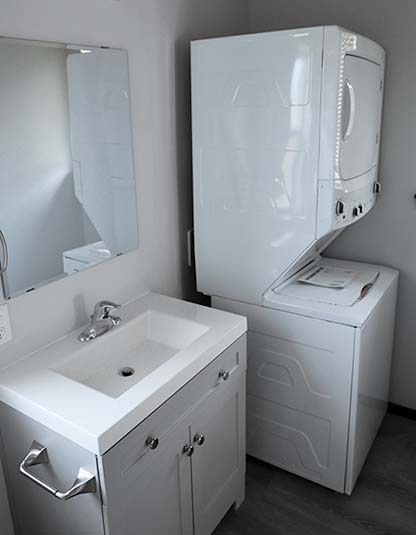
Back in early May, tribal council broke ground on the transitional living site. In the process they began a long requested service that will benefit Tulalip’s ever-growing membership. It’s been four months since that ground breaking and the first of several planned sites intended to prevent homelessness is now complete.
Located across the street from Tulalip Bay fire department, the inaugural site consists of five units that are fully furnished. Essential amenities include a bath tub with shower, kitchenette and stackable washer/dryer. The living space is compact (240 square feet), yet the sense of stability for those who will occupy each transitional unit is immeasurable.
Rent will be $300 per month to cover the water, sewer and Public Utility District (PUD) costs. Each unit will provide crucial comforts like electricity, temperature controlled heating and cooling, and connections for internet access.
Tulalip’s committed construction team put in all necessary work for what is sure to be a game changer in the community. Adding another layer of meaning, many of the hands involved in the construction were Tulalip tribal members who graduated from the Tribe’s vocational training center.
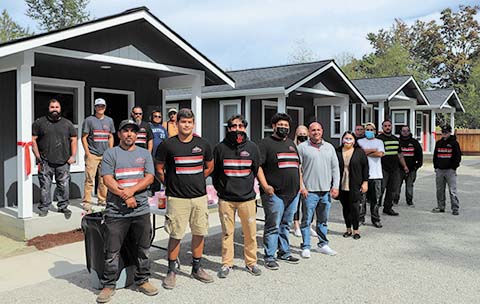
“I’m proud of my team and everyone we were able to bring onto this project. We really proved ourselves by staying within our budget and completing the construction quicker than many thought possible,” said interim construction director Stephen Quimby. “A lot of young tribal members out of the TERO program were able to gain much needed experience and be a part of something that’s going to bring hope to those who need it most.”
After seeing the finished units in person, Tulalip leadership was thoroughly impressed and commended the construction team for a job well done. Planning and development for a future second site is already underway.
For potential transition unit clients:
Applications are now available online at www.tulaliptribes-nsn.gov/Dept/Housing or from the CSR desk at the Admin Building. Submit application to transitionunits@tulaliptribes-nsn.gov or the CSR desk. Eligibility is outlined on the Housing website in the 2021 Transition Unit Procedures.
.
COVID-19 Case Update, Sept. 15
Seattle Mariners celebrate Indigenous People
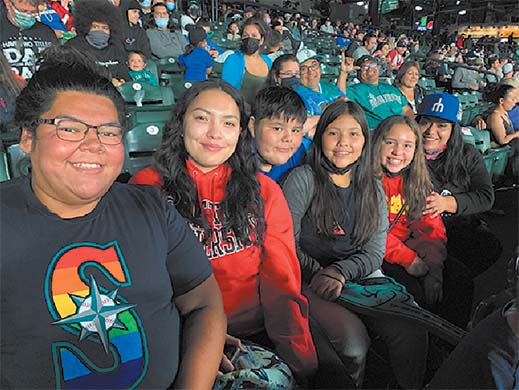
By Shaelyn Hood, Tulalip News
On Monday, September 13, 2021, the Seattle Mariners hosted their 18thannual Native American Heritage Night. The first 5,000 fans received a t-shirt by Chris Duenas that featured the Mariners “S” logo with Coast Salish motifs and the message, “We honor our ancestors”.
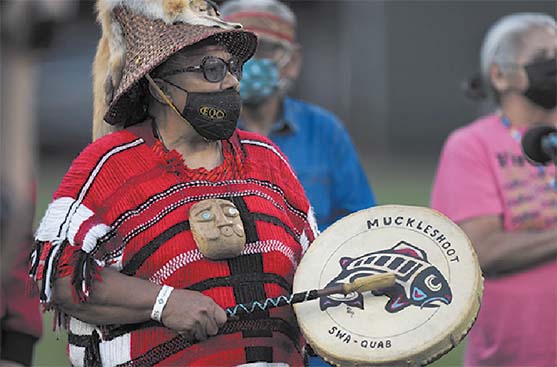
The night started off with a performance by members of the Puyallup tribe with a traditional song, drum, and dance. Throughout the night, fans enjoyed viewing a hand carved, 30-foot tribal canoe and a gallery of 40 works of art by local tribal artists.
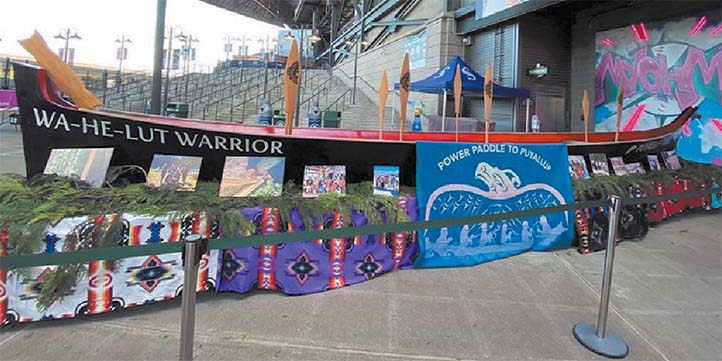
During the game, the Mariners honored Dr. Alan Shelton, a Puyallup tribe medical director, as a Hometown Hero, for advocating health and safety practices during the pandemic. The Mariners recognize members of the Pacific Northwest community at each game for their part in helping others to overcome the pandemic.
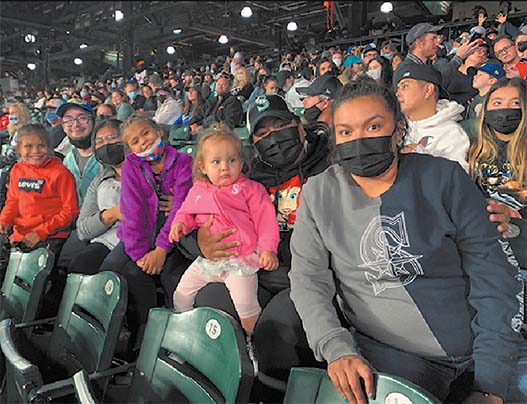
Barbara Hatch, Diana Aguilar, and Alex Havel.
If you wish to nominate someone who has stepped up to help others during this time, nominations are accepted through September 30, 2021 at www.mlb.com/mariners/fans/hometown-heroes.
